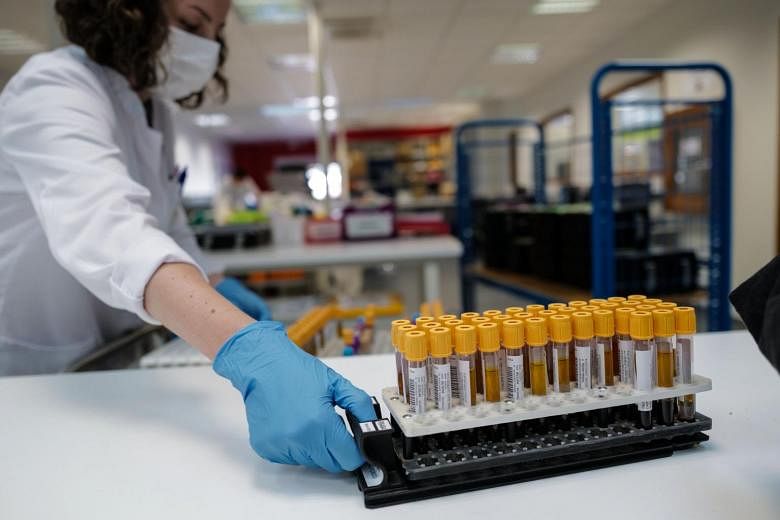NEW YORK (NYTIMES) - Why do some people infected with the coronavirus suffer only mild symptoms, while others become deathly ill?
Geneticists have been scouring our DNA for clues. Now, a study by European scientists is the first to document a strong statistical link between genetic variations and Covid-19, the illness caused by the coronavirus.
Variations at two spots in the human genome are associated with an increased risk of respiratory failure in patients with Covid-19, the researchers found. One of these spots includes the gene that determines blood types.
Having Type A blood was linked to a 50 per cent increase in the likelihood that a patient would need to get oxygen or go on a ventilator, according to the new study.
The study was equally striking for the genes that failed to turn up. The coronavirus attaches to a protein called ACE2 on the surface of human cells in order to enter them, for example. But genetic variants in ACE2 did not appear to make a difference in the risk of severe Covid-19.
The findings suggest that relatively unexplored factors may be playing a large role in who develops life-threatening Covid-19.
"There are new kids on the block now," said Dr Andre Franke, a molecular geneticist at the University of Kiel in Germany and a co-author of the new study, which is currently going through peer review.
Scientists have already determined that factors like age and underlying disease put people at extra risk of developing a severe case of Covid-19. But geneticists are hoping that a DNA test might help identify patients who will need aggressive treatment.
Figuring out the reason that certain genes may raise the odds of severe disease could also lead to new targets for drug designers.
As the pandemic gained momentum in February, Dr Franke and his colleagues set up a collaboration with doctors in Spain and Italy who were struggling with a rising wave of Covid-19.
The doctors took blood samples from 1,610 patients who needed an oxygen supply or had to go on a ventilator. Dr Franke and his colleagues extracted DNA from the samples and scanned it using a rapid technique called genotyping.
The researchers did not sequence all three billion genetic letters in the genome of each patient. Instead, they looked at nine million letters. Then the researchers carried out the same genetic survey on 2,205 blood donors with no evidence of Covid-19.
The scientists were looking for spots in the genome, called loci, where an unusually high number of the severely ill patients shared the same variants, compared with those who were not ill.
Two loci turned up. In one of these sites is the gene that determines our blood type. That gene directs production of a protein that places molecules on the surface of blood cells.
It's not the first time Type A blood has turned up as a possible risk. Chinese scientists who examined patient blood types also found that those with Type A were more likely to develop a serious case of Covid-19.
No one knows why. While Dr Franke was comforted by the support from the Chinese study, he could only speculate how blood types might affect the disease. "That is haunting me, quite honestly," he said.
He also noted that the locus where the blood-type gene is situated also contains a stretch of DNA that acts as an on-off switch for a gene producing a protein that triggers strong immune responses.
The coronavirus triggers an overreaction of the immune system in some people, leading to massive inflammation and lung damage - the so-called cytokine storm. It is theoretically possible that genetic variations influence that response.
A second locus, on Chromosome 3, shows an even stronger link to Covid-19, Dr Franke and his colleagues found. But that spot is home to six genes, and it is not yet possible to say which of them influences the course of Covid-19.
One of those gene candidates encodes a protein known to interact with ACE2, the cellular receptor needed by the coronavirus to enter host cells. But another gene nearby encodes a potent immune-signalling molecule. It is possible that this immune gene also triggers an overreaction that leads to respiratory failure.
It's not common for genetic variants to emerge out of studies of so few people, said Dr Jonathan Sebat, a geneticist at the University of California, San Diego, who was not involved in the new study.
"We were all hoping optimistically this was one of those situations," Dr Sebat said.











